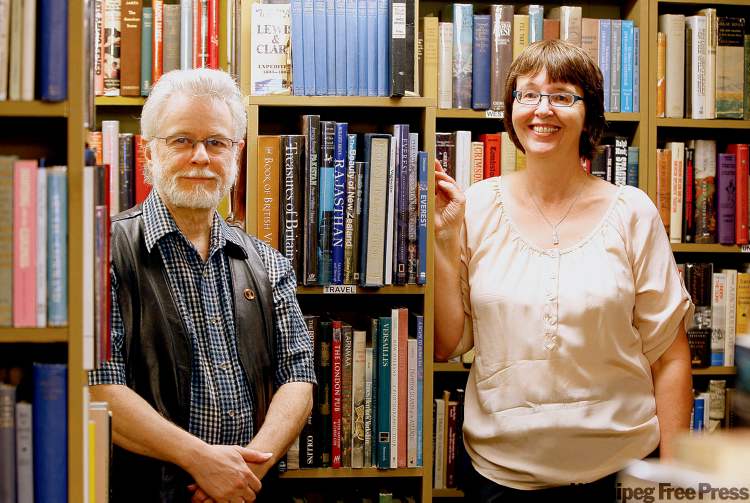Writing on the wall?
Owners of secondhand bookstores hold out hope for the printed page
Advertisement
Read this article for free:
or
Already have an account? Log in here »
To continue reading, please subscribe:
Monthly Digital Subscription
$1 per week for 24 weeks*
- Enjoy unlimited reading on winnipegfreepress.com
- Read the E-Edition, our digital replica newspaper
- Access News Break, our award-winning app
- Play interactive puzzles
*Billed as $4.00 plus GST every four weeks. After 24 weeks, price increases to the regular rate of $19.00 plus GST every four weeks. Offer available to new and qualified returning subscribers only. Cancel any time.
Monthly Digital Subscription
$4.75/week*
- Enjoy unlimited reading on winnipegfreepress.com
- Read the E-Edition, our digital replica newspaper
- Access News Break, our award-winning app
- Play interactive puzzles
*Billed as $19 plus GST every four weeks. Cancel any time.
To continue reading, please subscribe:
Add Winnipeg Free Press access to your Brandon Sun subscription for only
$1 for the first 4 weeks*
*$1 will be added to your next bill. After your 4 weeks access is complete your rate will increase by $0.00 a X percent off the regular rate.
Read unlimited articles for free today:
or
Already have an account? Log in here »
Hey there, time traveller!
This article was published 25/08/2011 (5146 days ago), so information in it may no longer be current.
Winnipeg has always been a great city for the used-book trade.
Bargain-hunting is in our blood. And with our tendency to stay rooted in our homes for decades, we’ve got attics and basements that yield all kinds of treasures for bibliophiles.
The entire book industry, though, is in upheaval as the Internet transforms publishing, sales and the very act of reading.

About two weeks ago, Winnipeg used-book dealer Kelly Hughes announced plans to close his Garry Street store and restaurant, Aqua Books and EAT! Bistro, saying he and his chef wife, Candace, can no longer sustain the business financially.
Hughes, 41, believes all bookstores are endangered by technological change, not just because downloadable e-books are surging in popularity, but because people are increasingly texting, surfing, playing electronic games and using social media, rather than consuming books in any form.
“It’s a cultural shift away from reading,” says Hughes, who has been in the business for 12 years. “This is not sour grapes. I just think the writing is on the wall for bookstores….
“I don’t think books are going to disappear like cassette tapes, but we’re in the midst of a major adjustment.”
Hughes’ observations seem to be borne out by events such as Borders, the second-largest U.S. bookstore chain, recently filing for bankruptcy protection and Amazon, the online sales giant, announcing in May that e-book sales have surpassed print-book sales.
U.S. publishing executives predict that within three years, half of all books sold will be e-books, CBS reported in May.
While the Internet has opened up global selling of used books, vendors on far-reaching sites such as AbeBooks — a Canadian company that was acquired by Amazon in 2008 — must pay both a listing fee and a percentage of every sale, making profit a challenge.
Yet on South Osborne Street, veteran used bookseller Burton Lysecki has an optimistic read on the future. His spacious self-named store celebrated 40 years in business in June. With 100,000 books (compared with Aqua’s 45,000), he has one of the city’s largest inventories.
He’s well established as an online vendor, with 25 to 30 per cent of revenue coming from Internet sales.
Last month, Karen Sigurdson, his store manager since 2002, showed her faith in the store’s viability by buying half the business. “This is what I was meant to do,” says the gung-ho Sigurdson, 50.
Lysecki, 66, says the partnership is partly a retirement strategy for him, but he has no plans to bow out yet. He admits that sales are in a slump, and that local dealers can’t take on much new inventory. “Everybody’s got lots of books and not much money,” he tells a would-be seller.
But he and Sigurdson don’t think it’s permanent. “Yes, we’ve gone through a rough couple of years, but we feel we can see a light at the end of the tunnel,” he says.
Sigurdson is certain there will always be a segment of the population that loves tangible books. If print book publishing fades away, she says, books will still be valued as collectible antiques.
Lysecki loves the tradition of books being passed along from one reader to another. “I like to consider myself the trustee of these books,” he says.

Sigurdson recalls the store buying a large book collection from an elderly man who had been an educator. “One of the books was a history of the ancient Greeks, very colourful, with lots of pictures. A 10-year-old boy bought that book, and I was so touched. I thought, ‘If he knew, he would be thrilled.'”
While Hughes points out that anyone can now sell their books online — cutting out the dealer — Lysecki says professional dealers offer greater security for the buyer. He had one customer who came in with a rare first edition he’d bought on eBay for about $10,000. It was authentic, but in such poor condition that no collector would buy it.
Declining sales and rising costs led Tony Hazzard, longtime president of the Winnipeg Association of Secondhand Booksellers, to close one of his two stores, The Bookshelf, in 2009 after 22 years in St. James. He still operates Cover to Cover on Pembina Highway, with 25,000 to 30,000 titles in stock and 50,000 in storage.
“It’s definitely been a struggle,” says Hazzard, 47. “My daily sales are down for the last two or three years. I’m concerned, but there are people who still love the feel of books, the texture….
“I talked to a person today who has an e-book reader, and she doesn’t like it. She wanted to buy a book. It’s not all doom and gloom.”
Hazzard thinks that as baby boomers retire, there may be a nostalgia wave that will see them seeking out books as comforting touchstones of the past.
Bucking the trend of declining sales is Bill Fugler, owner of the Neighbourhood Bookstore & Café in Wolseley. When he opened about five years ago, the café fare outsold the books by four to one. Recently, that has shifted and some days, the books — Fugler displays about 9,000 of them — outsell the food and drinks.
Like the other dealers, Fugler, 45, says secondhand bookshops are community places where patrons feel welcome. The experience is the antithesis of searching for a book online.
“We always have people come in and give us a complex description (of a book). They say, ‘I don’t know the title. I don’t know who wrote it.’ One of our staff will say, ‘Oh, yes, we have that in the basement.’ We run down and get it for them….
“Used books pick up aspects of the people who read them before. We have a policy of leaving whatever was in the book when we bought it. We’ve had pages from diaries, personal letters, bookmarks from other cities, bus tokens, photographs…. That’s part of the experience.”
Aqua Books’ Hughes has been so amazed at the outpouring from the community — and the sudden surge in sales — since he announced Aqua’s demise, he now says the business may survive in some form.
“We’re figuring out if there’s a way to salvage some of what we’ve been doing,” he says. “People want us to continue.”
alison.mayes@freepress.mb.ca
History
Updated on Thursday, August 25, 2011 10:51 AM CDT: Name of association corrected in sidebar.



